Nothing beats the feeling of typing The End following the last scene of your manuscript. You’ve spent weeks to months to years laboring over sentence construction, timeline details, and character development, among many other things. Now is the time to celebrate.
Because soon, it will be time to edit.
If you’re groaning, stop it. This is where you take your masterpiece and smooth the rough edges. Not all artists have this luxury. We writers get as many passes as it takes to get it right.
There is a myriad of posts and checklists on how to best attack the editing process. I like to start with three easy (though not necessarily quick) edits that give me a sense of immediate progress. Following these suggestions will result in tighter prose and eliminate several “flag” words that could make an editor or agent pass on your project.
For illustration purposes, I’m using screen shots from my own WIP that I’m about a quarter through writing.
1.Scrutinize the filters
Do an MS search (see the red circle if you’re using Word and don’t know how) for each of these words: saw, heard, thought, realized, noticed, knew, understood (or the present tense of these verbs if your story is in present tense).
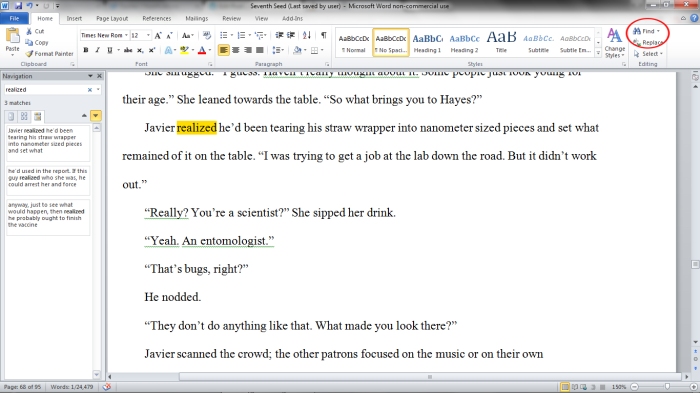
The words I listed are often used in filters, or those phrases that say what the character sees/hears/thinks etc. The example in the screen shot is one. They force the reader to be a step back from the story because instead of experiencing the story directly through the POV character, we’re being told what the character is experiencing. More often than not, you can cut filters without losing meaning and keep the reader closer to the narrative.
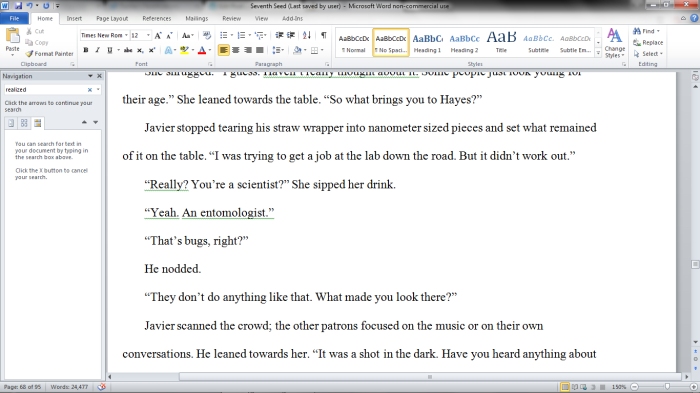
For more information about filters, check this post.
2. Scrutinize the adverbs
Stephen King famously said this: The road to hell is paved with adverbs.
Some writers balk at this idea. “Writing is an art,” they say. “How can I paint a full picture without all the colors?”
I believe Morpheus can help me with this one.
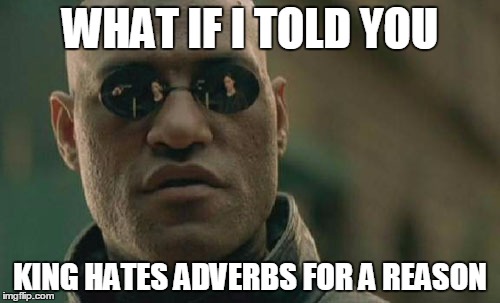
That might be harsh. Maybe he doesn’t hate adverbs, but they certainly (adverb!) fall in disfavor with many of the pros.
Adverbs are the ugly stepchild of the English language for a couple of reasons. One, they can be a crutch for weak verbs (the character can rush instead of walk quickly). And two, they can disrupt the flow of the prose (specifically -ly adverbs).
The easiest way to find your adverbs is to search “ly” and scroll through the results. They won’t all be adverbs, but at least some will be.
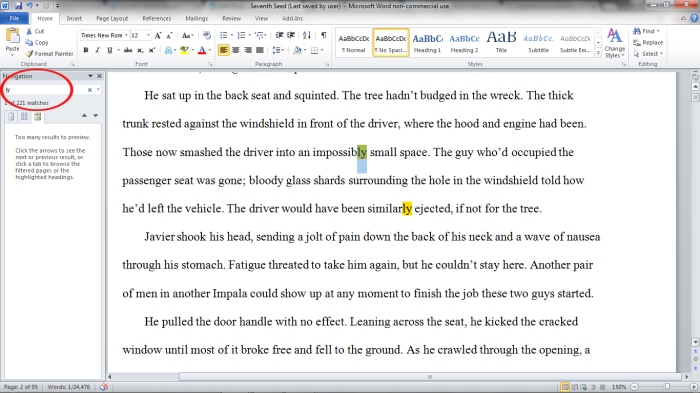
Notice in both this and the previous point about filters, I said scrutinize, not necessarily cut. Make these words earn their keep. You could work out your sentences to include no adverbs, but you might end up with something clunkier in the end. This is where the art comes in.
In the screen shot, I could cut “impossibly”, or perhaps say an alternate like “tiny” or “microscopic.” I’m not sure those fit with my voice and the situation, though. And with “similarly”, I could say “would have also been ejected”, but that feels bumpier to me. For now, these adverbs get a pass.
Here’s one I can easily cut:
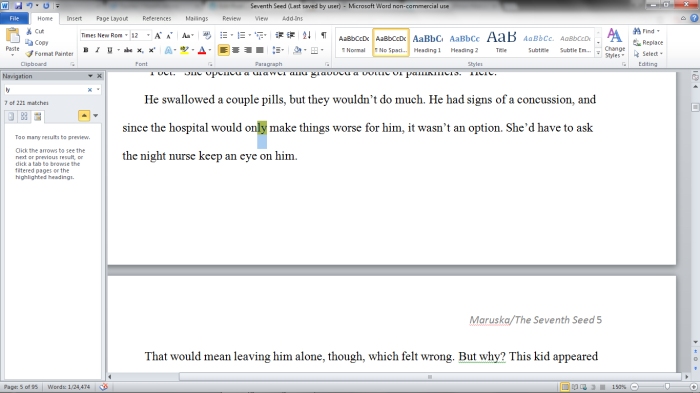
“Only” adds nothing to the meaning of that sentence, so it’s gotta go.
There is one instance I would argue should never have an adverb, and that’s when associated with a dialogue tag. Check out point 5 in this post for more information about that.
3. Cut most “newbie” words
There are certain words that could serve as “flags” for editors, agents, and seasoned readers – flags that say this writer hasn’t been at it too long. The thing with these words is even if you have been writing for a while, they sometimes become easy crutches and can creep into your writing.
Do an MS search for variations of the following words: turn, smile, frown, laugh, nod, shrug, look, just, went, began, started, could/can, sudden, and all the filter words (but you already took care of those, right?).
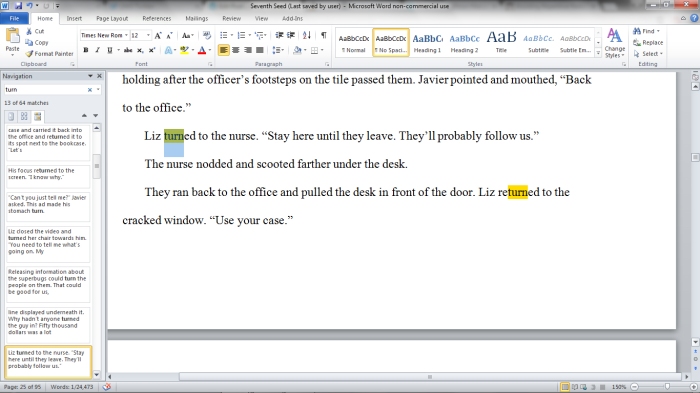
I used “turn” in a beat in this example, but I could use a more visual one, like Liz putting her hand on the nurse’s shoulder. You may have noticed “nodded” in the paragraph after that one. I could cut it, but I like the sense of agreement there, so that one might get to stay. I’ll make sure there isn’t a nod occurring too soon before or after this one.
In the case of began/started, cut all instances except when the action wasn’t completed.
He began walking to the house. –> He walked to the house.
A note on dialogue: in the interest of keeping dialogue sounding natural, I’m less picky about all the words I listed in this post. My characters say “look”, “I know”, “probably”, and similar phrases. As long as the words aren’t repeated in a short space, I let my characters say what they want to say.
Conclusion
Editing is a long process, and you have to start somewhere. If you’re like me, starting with something concrete, like these three strategies, gives an immediate sense of accomplishment. These are by no means the only things to do when editing. This is surface level stuff. But if you take care of these things before you pass the work on to critique partners and beta readers, they can focus on the deeper issues, like character development, POV, pacing, and sequence.
Do you have an editing strategy in place? Does it include steps similar to these?


Pingback: Submission Sundays: Tor Novellas 2 – Jennifer Shelby
Thank you for this!
I’ll admit I cringed when I read “turn” was a red flag. That one hangs me up. I’m still working on how to handle movement in my work. It seems like I either get way to meta, or I don’t use enough description. *sigh*
LikeLike
I get that. Sometimes it feels like there aren’t enough available words…
LikeLike
Yeah, great advice you have here. I clearly need to edit! Clearly lol. And, I don’t want to end up in Hell because of adverbs.
As someone whose thinking of going the self-publishing route, I needed to see this post. 🙂
LikeLike
Glad it’s helpful! Thanks for reading. 🙂
LikeLiked by 1 person
Pingback: Where Writers Get Stuck: Editing and Revising | A Writer's Path
Pingback: Friday Roundup – 8th June | Stevie Turner
Perfect timing! I just checked my most recent MS for filter/overused words. >>> Spin, spun, flash, whirl <<< How any of my characters are still standing, I have no idea lol
LikeLiked by 1 person
This is good advice, Allison. I am glad to see my pet words “very” and “was” are not on you new writer list. I had to eliminate quite a number of these.
LikeLiked by 1 person
Oh yeah, the infamous “was”. It gets picked on because it’s an indicator of passive voice – maybe. Context is key.
LikeLiked by 1 person
I recently dropped $50 on an editing software app called Pro Writing Aid. I hope it catches everything you pointed out…and more. Have you used anything like that?
LikeLiked by 1 person
I’ve used ProWritinAid! It gives good information, and you can add your own crutch words to the overused words it searches.
LikeLike
Reblogged this on anita dawes and jaye marie.
LikeLike
Thanks for sharing!
LikeLiked by 1 person
Reblogged this on Allison Maruska and commented:
I’m reblogging from the archives because editing/revising will soon be my whole life.
LikeLike
Hi Alison,
To answer your question…”Do you have an editing strategy in place?” Yes, and it’s almost identical. The (adverb alert –>) only difference is the word list for point #3. I have not been cutting the first half like frown, nod, shrug, and turn.
Should they be avoided at all costs? or kept if used in a descriptive beat?
Ex: John shrugged his shoulders and walked away. (Rather blah and I get the idea of a cut here)
Ex: After a shrug and an annoyed breath, John said, “Sorry. But I don’t know what our next move should be.”
What’s your verdict? 🙂
P.S. Thank you for separating dialog from the rest of the text.
LikeLiked by 1 person
Not necessarily avoided at all costs, but I would ask if there’s another way to show the emotion. If it’s annoyance, I’d probably have a male character run a hand through his hair and a female mess with her nails. To me, a shrug shows apathy. My current WIP has moody pre-teens who have no problem shrugging and huffing. 😉
LikeLike
I’ve read your book, so I’ll take your advice. Mille grazie Signora 🙂
LikeLiked by 1 person
Pingback: Throwback Thursday: Four Questions to Ask Before You Hit “Publish” | A Writer's Path
Pingback: Where Writers Get Stuck: Editing and Revising | Allison Maruska
Reblogged this on When Angels Fly.
LikeLiked by 1 person
Pingback: Four Questions to Ask Before You Hit “Publish” | A Writer's Path
Pingback: Four Questions To Ask Before You Hit “Publish” | Allison Maruska
Great ideas here! I am so bad with using all of these in a first draft and definitely need to cut a bunch out when I’m done. I thought it was interesting that you suggested starting here since this is actually one of the last things I do. I tend to have to rewrite a bunch of stuff in second and third drafts and don’t like to focus on individual words until the end, once I’ve more or less got the story structured how I want it. But I can definitely see how it would be a good starting point and maybe make the whole editing process seem less scary since you can immediately fix most of this stuff.
LikeLiked by 1 person
I like the feeling of quick accomplishment. 🙂
LikeLiked by 1 person
Great easy cuts. Then come the hard ones. Story edits. 🙂
LikeLiked by 1 person
Exactly. I like to get the easy stuff out of the way first. 🙂
LikeLike
My worst filler words: just, even, only. In a 90K ms I’m working on, I had over 100 of each. (Now I have 10 of each.)
LikeLiked by 1 person
Great job! “Just” gets me too. One of my CPs noticed and keeps a keen eye out.
Thanks for reading and commenting!
LikeLike
Reblogged this on My Writing Blog and commented:
Great tips!
LikeLike
Glad you found it useful! Thanks for the reblog! 🙂
LikeLike
The more I learn (from angels such as yourself) I think I may have to go on a creative writing course!
LikeLike
I never did. Everything I learned came from working with other authors. 🙂
LikeLiked by 1 person
Great post!
“an immediate sense of accomplishment” is important because editing sucks. Meanwhile, these three strategies, do something else. Suffering through the rote, tedious, kill-me-now process of removing these words will train you to hesitate when you go to type them again. Trust me, this exercise works with dialog tags, too.
The removal process will save you time, too, because you’ll have a lost of good replacement words when you’re finished. Your future Ms will still have a word here and there but nothing like the first time, and even your CP’s will understand they’re just “plug words” until you can come up with something better.
Maybe they’ll suggest something, too, which is nice. Cos after taking out 20 looks, you won’t be able to think of any.
LikeLiked by 2 people
Your point about training yourself out of writing these words in the first place is so true! My first book ever was filter city. Full of people “noticing” stuff. *shudder*
LikeLiked by 1 person
So glad I read this!
LikeLiked by 2 people
Me too! 😉
LikeLiked by 1 person
This is really useful to a naïve writer like me. Whoops should be ‘This is useful’ as you already know I’m naïve! … ! As I’m mainly writing dialogue I’m now looking forward to editing! And yes I’ve already been told I use too many exclamation marks! Please keep teaching and I’ll keep learning.
LikeLiked by 2 people
Hey, we all had to start at the beginning, right? 😉 I’m glad you find this useful. Good luck in your editing!
LikeLiked by 1 person
Great advice!
LikeLiked by 2 people
Thanks! 🙂
LikeLiked by 1 person